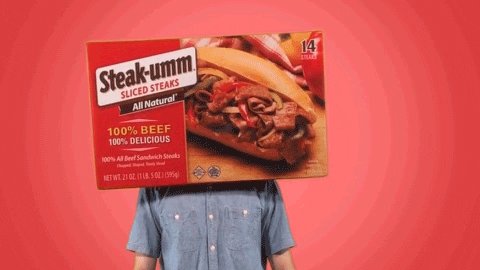
Image source: Steak-Umm via Twitter
Brands often assume different tones on social media. Some try to be comedians. Some take a formal tone. Some try to seem hip to relate to young customers. Many simply broadcast their latest deals, products and advertisements.
Steak-Umm is doing something entirely different. The purveyor of frozen beef slices has assumed the role of vigilante against social media misinformation, a defender of facts and a promoter of thoughtful analysis. The brand recently went on a tweetathon bemoaning the deplorable amount of coronavirus misinformation and rumors on social media. Taking an intellectual, even scientific, tone, Steak-Umm sought to educate viewers on how to analyze information and spot misinformation and unproven reports.
Steak-Um demonstrates how social media marketers who handle the corporate accounts can take a leading role in countering the coronavirus misinformation infodemic that plagues the internet.
How to Consume Media
One Steak-Um tweet example: “outliers attempting to counter global consensus around this pandemic with amateur reporting or unverified sourcing are not collecting data. breaking news stories that only relay initial findings of an event are not collecting data. we have to be careful in our media consumption.”
outliers attempting to counter global consensus around this pandemic with amateur reporting or unverified sourcing are not collecting data. breaking news stories that only relay initial findings of an event are not collecting data. we have to be careful in our media consumption
— Steak-umm (@steak_umm) April 7, 2020
Many commenters expressed gratitude. Many were incredulous that a frozen beef brand had become a leading voice of reason. The tweets led to extensive media coverage in major online news sources. Steak-Umm may be gaining attention precisely because it’s a frozen beef brand as people dwell on the absurdity of the frozen beef teaching people about data analysis.
Steak-Umm continues its critical thinking offense: On Friday, it tweeted: “gonna keep preaching from the frozen meat pulpit until this account runs into the ground because that’s marketing baby”
The Marketer Behind the Brand
The person behind Steak-umm’s tweets, Allebach Communications social media manager Nathan Allebach, said he was fed up with coronavirus misinformation.
“It was more just a cumulative effect of me having a job to spend every moment on social, seeing a constant flow of information, and a lot of it wasn’t good information,” Allebach told Fast Company. “I know we’re in this state of panic, and heightened cultural anxiety, so people aren’t at their best all the time, thinking about where they’re getting their information.”
He added: “It’s a weird situation for brands to be in right now, to not be overtly advertising their products, while also trying to add PSAs, but not wanting to be bland about it. It’s just been a process of seeing where the country and the world is at and trying to see if we can interject some thoughtful commentary into the mix.”
Companies and other organizations typically monitor social media for mentions of their products and brands. They respond to fake news and other forms of fallacies only if their products and brands are mentioned. But the Steak-Umm’s example shows how brands can gain respect and increase awareness of their products by promoting facts and encouraging thoughtful analysis.
Other brands may follow its example. Coca-Cola announced that its Twitter feed “is going to look a little different as we donate our social feeds to experts and partners sharing helpful information.”
Bottom Line: Steak-Umm’s well-publicized beef against COVID-19 misinformation proves that brands can do more than promote their wares on social media. They can take a leading role in exposing coronavirus fake news and sharing accurate information.

Michael Kling is manager of public relations, marketing and social media at Glean.info, a media monitoring and measurement service that provides customized media monitoring and PR analytics solutions.



